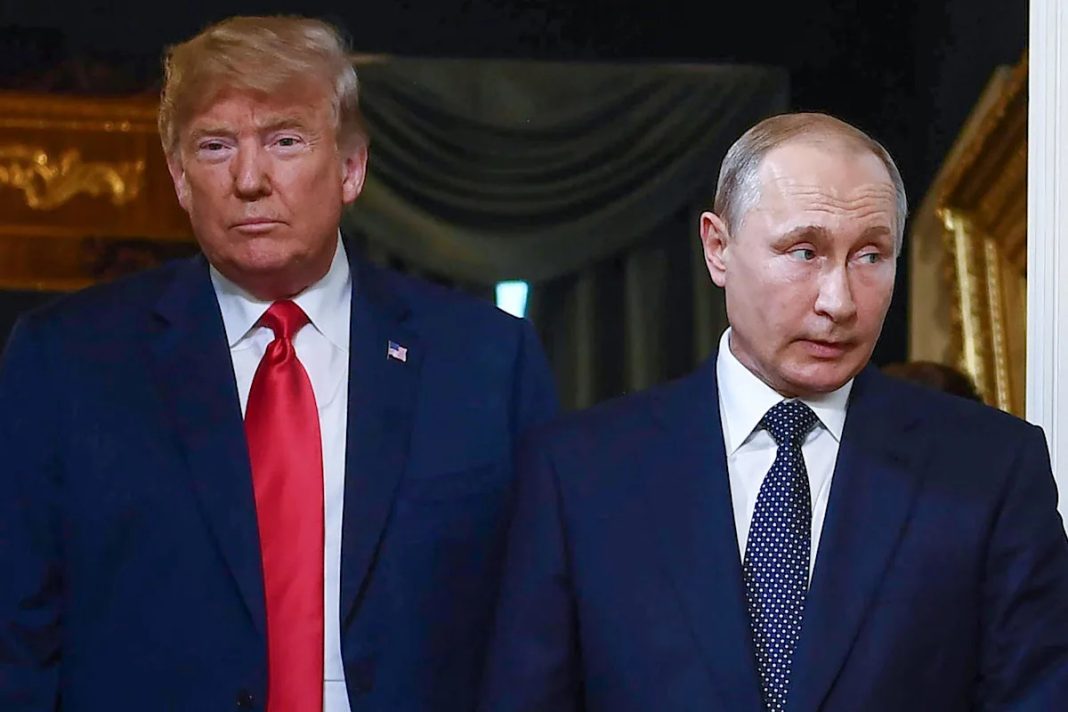At an Oval Office event on Wednesday, Donald Trump fielded some questions from White House reporters, many of whom pressed the president on the major topic of the day. “Mr. President, will you ask Attorney General Pam Bondi to release more documents to finally put this controversy to an end?” one asked, referring to the Jeffrey Epstein controversy.
As part of his response, the Republican president eventually got around to saying the story is “no different than Russia, Russia, Russia.”
It was a familiar refrain. In fact, Trump made a nearly identical claim earlier in the day. And the day before. And a few days before that. And two days before that.
The point, evidently, is relatively straightforward: The president is facing allegations related to the late alleged sex trafficker, which has led him to effectively argue that if the Russia scandal was fake, the Epstein scandal should necessarily be seen as fake, too.
For those who’ve read my second book, this probably sounds familiar. Indeed, the president has made this same pitch repeatedly in recent years. When he was accused of illegally bringing classified documents to Mar-a-Lago, he said the case was “just like RUSSIA, RUSSIA, RUSSIA.” When the New York attorney general’s office accused the Trump Organization of fraudulent business practices on a systemic scale, Trump declared: “This is like Russia, Russia, Russia.” When the Jan. 6 committee’s report came out, he said the panel’s members were not to be trusted — because they believed “the RUSSIA, RUSSIA, RUSSIA HOAX.”
For the president, this line has been a get-out-of-trouble-free card for years, to be played ad nauseam: If the Russia scandal wasn’t real, the argument goes, then voters should necessarily discount every other controversy related to the president.
There are two rather important flaws with the argument. The first is that logic doesn’t work this way: If someone is falsely accused of wrongdoing, it doesn’t mean that all future accusations must necessarily be seen as false.
The second problem is that Trump’s Russia scandal is still real, no matter how many times he pretends otherwise.
Indeed, the president’s timing could be better: It was literally just last week when Trump’s handpicked CIA director released the findings of an internal investigation that concluded, once again, that Russia attacked the U.S. political system in 2016 because Putin’s regime wanted to put Trump in the White House.
But if the president is determined to keep talking about this on a near-daily basis, perhaps now is a good time to review some basic truths about the Russia scandal, many of which are too often overlooked.
Russia attacked the American elections in 2016
Every U.S. intelligence agency and lawmakers from both parties have long agreed that the Kremlin launched an expansive and expensive covert military intelligence operation that targeted the U.S. political system in 2016. This basic fact is no longer contested — except by Trump, who publicly declared that he found Putin more reliable than his own administration’s officials — and its importance is too often overlooked.
Russia’s goal was to put Trump in power
The Kremlin’s operation was not politically neutral: Moscow attacked our elections in the hopes of helping dictate the outcome. According to the findings of U.S. intelligence agencies, special counsel Robert Mueller’s investigation, and the multi-step investigation from the GOP-led Senate Intelligence Committee, Russia saw Trump as a prospective ally and believed it would be in its interests if the Republican were in the White House.
Russia and Team Trump were political allies
As regular readers know, investigations from Mueller’s team and the GOP-led Senate Intelligence Committee documented the extent to which Trump and his team welcomed, received and benefited from Russian campaign assistance. (They also obstructed the investigation into this assistance — by some measures, 10 times.)
The evidence also showed there was coordination and high-level connections between Trump’s political operation and those responsible for the attack on our elections. The Senate Intelligence Committee’s report at one point literally described a “direct tie between senior Trump Campaign officials and the Russian intelligence services.”
Team Trump lied about its communications with Russia
No, really, Team Trump lied about its communications with Russia. A lot. Out loud and on record. Over and over again, Trump and his spokespeople insisted there were absolutely no interactions between the Republican, his political operation and their Russian benefactors. We now know definitively that they were lying — and they’ve never been forthcoming about why.
The Russia scandal led to a series of felony convictions and prison sentences
For an alleged “hoax,” the Russia scandal led to an amazing number of federal prosecutions. In fact, the investigation led to the convictions of, among others, Trump’s White House national security adviser, campaign chairman, deputy campaign chairman, foreign policy adviser and personal lawyer, and to the indictment of 13 Russian nationals who interfered in our elections as part of the larger plot.
I realize, of course, that there are all kinds of contentious details and personalities related to the controversy, which are still being debated, years later, as part of the broader conversation about the story. But these core truths remain unambiguous: Russia attacked our elections to help Trump. The Republican’s political operation welcomed, received, benefited from and lied about Russian campaign assistance. Many key players from Trump’s inner circle were charged, prosecuted and convicted.
These aren’t opinions. They’re conclusions drawn from multiple, bipartisan investigations, conducted across several years.
If the president is of the opinion that the Russia scandal and the Epstein scandal are of equal validity, then the White House should prepare for the ongoing controversy to become even more dramatic.
This post updates our related earlier coverage.
This article was originally published on MSNBC.com

